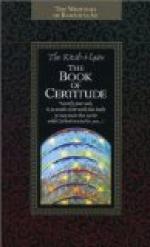How, We wonder, do they explain the aforementioned tradition, a tradition which, in unmistakable terms, foreshadoweth the revelation of things inscrutable, and the occurrence of new and wondrous events in His day? Such marvellous happenings kindle so great a strife amongst the people, that all the divines and doctors sentence Him and His companions to death, and all the peoples of the earth arise to oppose Him. Even as it hath been recorded in the “Kafi,” in the tradition of Jabir, in the “Tablet of Fatimih,” concerning the character of the Qa’im: “He shall manifest the perfection of Moses, the splendour of Jesus, and the patience of Job. His chosen ones shall be abased in His day. Their heads shall be offered as presents even as the heads of the Turks and the Daylamites. They shall be slain and burnt. Fear shall seize them; dismay and alarm shall strike terror into their hearts. The earth shall be dyed with their blood. Their womenfolk shall bewail and lament. These indeed are my friends!” Consider, not a single letter of this tradition hath remained unfulfilled. In most of the places their blessed blood hath been shed; in every city they have been made captives, have been paraded throughout the provinces, and some have been burnt with fire. And yet no one hath paused to reflect that if the promised Qa’im should reveal the law and ordinances of a former Dispensation, why then should such traditions have been recorded, and why should there arise such a degree of strife and conflict that the people should regard the slaying of these companions as an obligation imposed upon them, and deem the persecution of these holy souls as a means of attaining unto the highest favour?
Moreover, observe how these things that have come to pass, and the acts which have been perpetrated, have all been mentioned in former traditions. Even as it hath been recorded in the “Rawdiy-i-Kafi,” concerning “Zawra.” In the “Rawdiy-i-Kafi” it is related of Mu’aviyih, son of Vahhab, that Abu-’Abdi’llah hath spoken: “Knowest thou Zawra?” I said: “May my life be a sacrifice unto thee! They say it is Baghdad.” “Nay,” he answered. And then added: “Hast thou entered the city of Rayy?",(183) to which I made reply: “Yea, I have entered




